Key takeaways:
- The journey to understanding voting rights is deeply personal and often sparked by community conversations and personal experiences.
- Political media plays a crucial role in informing the public, shaping perceptions, and holding candidates accountable during elections.
- Engaging with local organizations and online resources empowers individuals with the knowledge necessary to navigate the electoral process effectively.
- Collective efforts to educate others about voting rights can inspire a larger community movement and strengthen democracy.
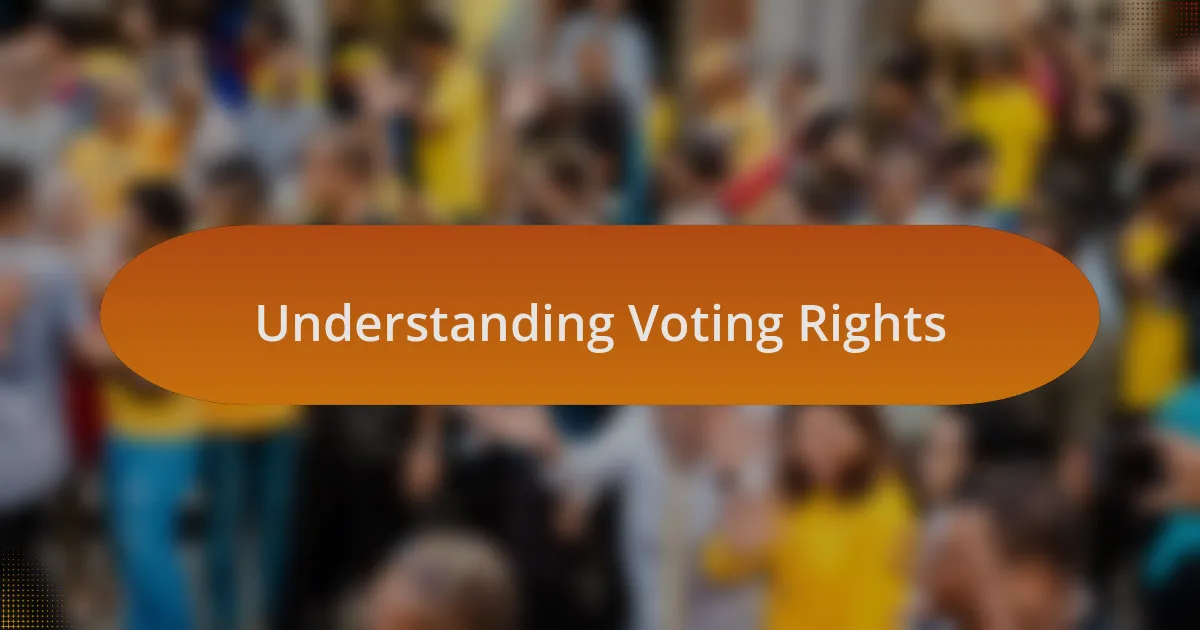
Understanding Voting Rights
Voting rights are a fundamental aspect of our democracy, yet many people are unaware of the complexities involved in securing them. I remember the first time I understood this—sitting in my high school civics class, I felt a mix of confusion and curiosity as my teacher explained how different groups fought tirelessly for our rights. It made me wonder: why do so many take this precious right for granted?
The historical struggle for voting rights is not just a topic for textbooks; it’s deeply personal. I reflect on my own journey when I first registered to vote, feeling a surge of pride mixed with anxiety. The weight of responsibility loomed large as I considered the sacrifices made by countless individuals to ensure that my voice would count in elections. It’s vital to remember that every vote carries the legacy of those who fought for us to have a say in our future.
Understanding voting rights also means recognizing the barriers that still exist today. I often ask myself, how can we make this process more accessible for everyone? Despite advances, countless individuals still face obstacles—whether through voter ID laws or disenfranchisement—reminding us that our work is far from over. Engaging in this conversation not only empowers us, but also honors those who paved the way for our rights.

Importance of Political Media
Political media serves as a vital conduit for informing the public about electoral processes and rights. From my experience, tuning into a local broadcast during an election cycle can dramatically shape one’s understanding of candidates and issues on the ballot. It’s striking how a singular report can inspire someone to engage in the political sphere, making them more aware of their voting rights.
Engaging with political media also brings a sense of community and solidarity among voters. I recall scrolling through social media platforms, where conversations on voting rights were vibrant and filled with passion. It was reassuring to see others share their own experiences, making the pursuit of voting rights feel like a collective journey rather than a solitary battle. When we see each other actively participating in discussions, it reminds us of our shared responsibility to stay informed and engaged.
Moreover, political media challenges misinformation that can undermine voter participation. I remember a time when misleading information about voting procedures circulated widely. Thanks to dedicated journalists and fact-checkers who worked tirelessly to set the record straight, I felt empowered to educate others around me. Isn’t it fascinating how the right information at the right time can inspire a community to rally around the truth and defend their rights?
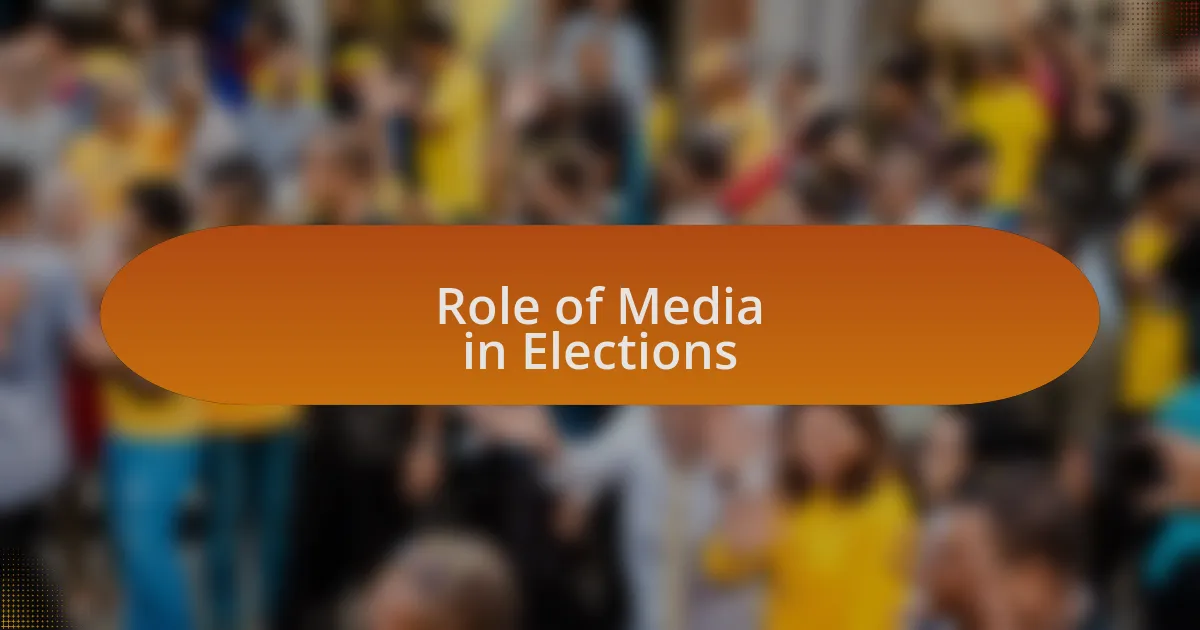
Role of Media in Elections
The media plays a crucial role in shaping public perception during elections. I distinctly remember sitting in my living room, flipping through various news channels, each presenting different angles on the same debate. It was enlightening, as I began to recognize the bias in certain reports, prompting me to seek out diverse viewpoints to form a well-rounded opinion about the candidates. How often do we let a single narrative dictate our understanding of complex issues?
In addition to informing the electorate, media serves as a powerful platform for candidates to communicate their positions. I was struck by the ways candidates utilized social media to connect directly with voters, sharing personal stories that resonated on a human level. Watching these interactions unfold reminded me that elections are not just about policies; they are about people, and the media provides the stage where those stories come to life.
Furthermore, the media fosters accountability by scrutinizing candidates’ claims and actions. I vividly recall a moment during a campaign when a journalist challenged a candidate’s statement about their record, presenting facts that contradicted the claim. This pivotal moment made me realize how essential investigative journalism is in ensuring a fair electoral process. Can we fully appreciate our voting rights without a media landscape that holds those in power accountable?
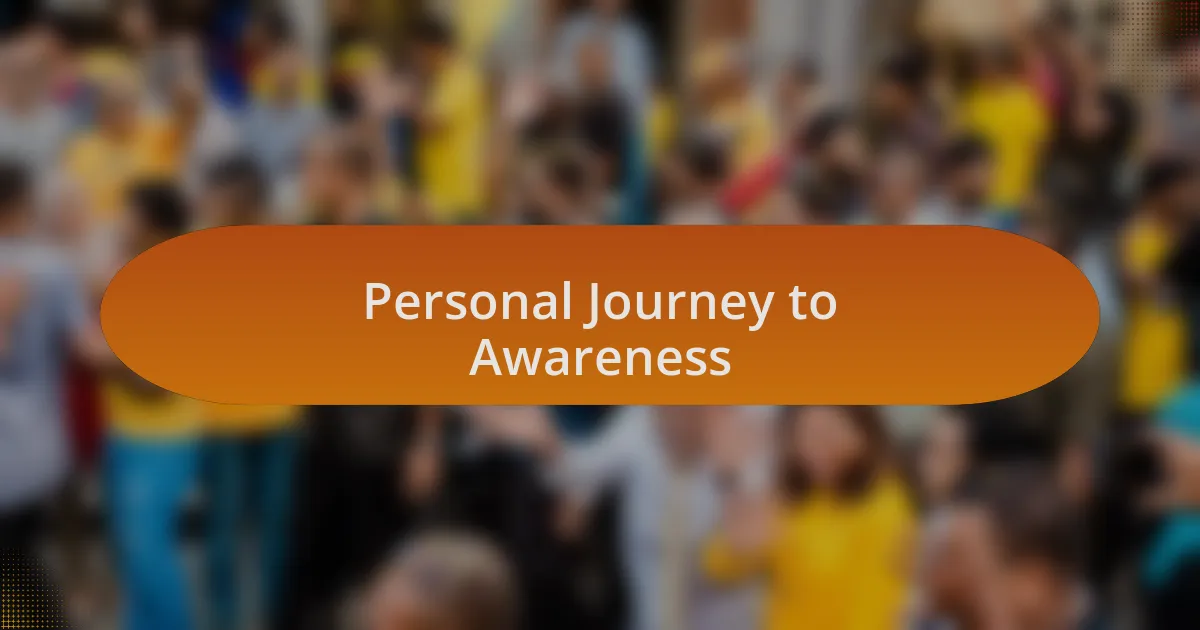
Personal Journey to Awareness
Personal Journey to Awareness
As I embarked on my personal journey to understand my voting rights, I remember feeling somewhat adrift in a sea of information. The first spark of awareness came when I stumbled upon a community forum discussing voter registration processes. It was eye-opening to see how many people shared their struggles and successes, prompting me to reflect: why hadn’t I considered the importance of being proactive about my participation in the electoral process?
One day, while volunteering at a local campaign office, I overheard a conversation about voter ID laws and their implications for marginalized communities. Hearing the urgency and passion in my peers’ voices made me feel a mix of anger and motivation. It was as if a light bulb had turned on; I realized that understanding voting rights wasn’t just about checking a box in a civic duty. It became a deeply personal mission for me to ensure everyone, regardless of their background, had a voice at the polls.
With each subsequent election, I found myself not only voting but educating others about their rights. I recall helping a friend navigate the registration process, feeling a sense of fulfillment as I shared what I had learned along the way. Isn’t it remarkable how elevating our awareness can empower not just ourselves but those around us? This journey proved that being informed is essential, not just for us as individuals, but for the betterment of our democracy as a whole.
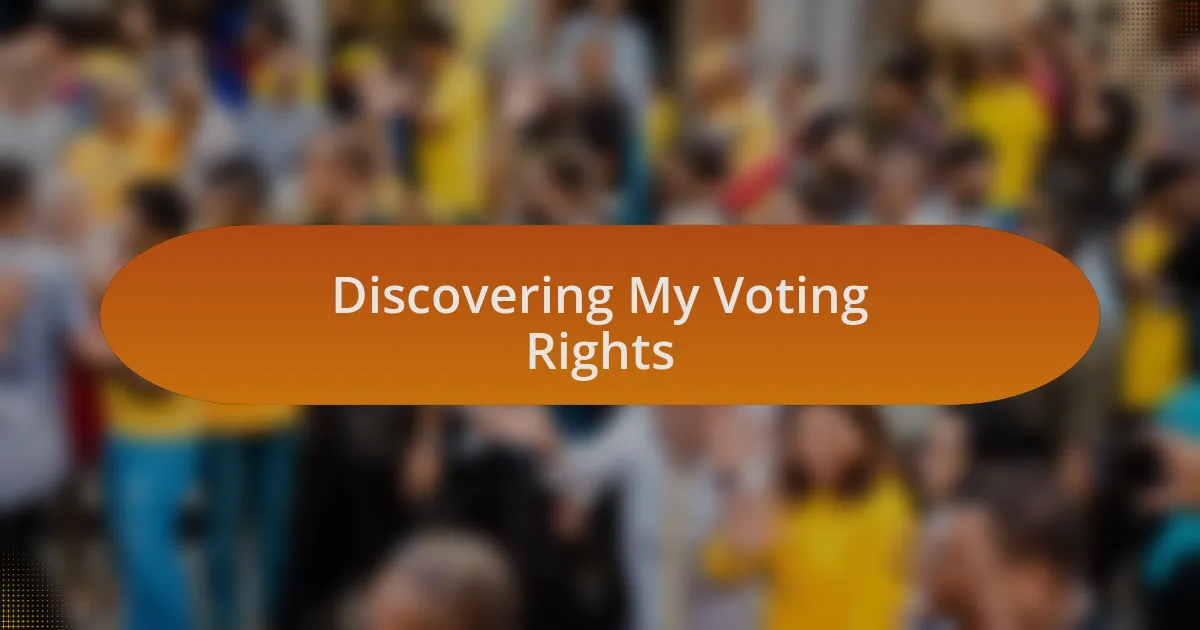
Discovering My Voting Rights
As I delved deeper into understanding my voting rights, I discovered that many misconceptions clouded this important topic. I recall a moment when a close family member expressed doubt about whether their vote even mattered. That conversation stirred something within me; I realized that sharing accurate information could change minds and ignite passion in others. How many people are out there feeling powerless simply because they haven’t had the right conversations?
During a local town hall meeting, I had an eye-opening discussion about the history of voting rights in our country. Listening to activists recount their struggles inspired me to trace my own family’s voting history, revealing stories of resilience against discrimination. It struck me how crucial it is to not only know our rights but to also honor those who fought for them. Are we doing enough to keep that legacy alive?
Educating myself about voting rights transformed into a communal effort. I remember organizing a small gathering in my living room where friends could learn about their rights and ask questions without judgment. Watching their faces light up as they grasped the power of their vote was incredibly rewarding. Isn’t it fascinating how one person’s journey can spark a collective awakening?
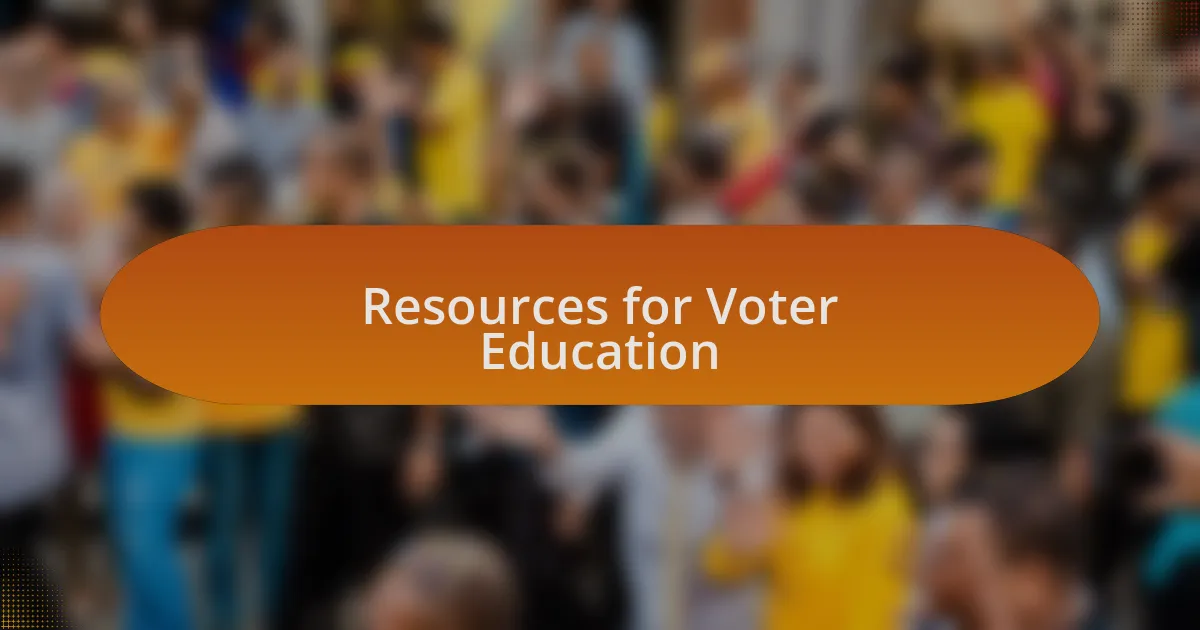
Resources for Voter Education
One of the most valuable resources I encountered during my journey was local community organizations dedicated to voter education. They offered workshops and seminars that broke down complex topics like voter registration and election laws into digestible pieces. The first time I attended one of these sessions, I left feeling empowered and armed with knowledge. Have you ever walked away from a meeting thinking, “Now I know what to do”?
Another important resource has been online platforms that offer state-specific information about voting rights. I stumbled upon a website that not only explained my rights but also provided tools to check my registration status and view upcoming elections. It felt like having a personal guide through the maze of civic engagement. How liberating is it to know that information is just a few clicks away?
Moreover, I’ve found that social media can be an excellent source for voter education. Following advocacy groups and local leaders on platforms like Twitter and Facebook keeps me updated with real-time information. I vividly remember a post that reminded me of registration deadlines; it felt like a little nudge from a friend. Isn’t it comforting to know that you can connect with a community that cares about voter activism and support?
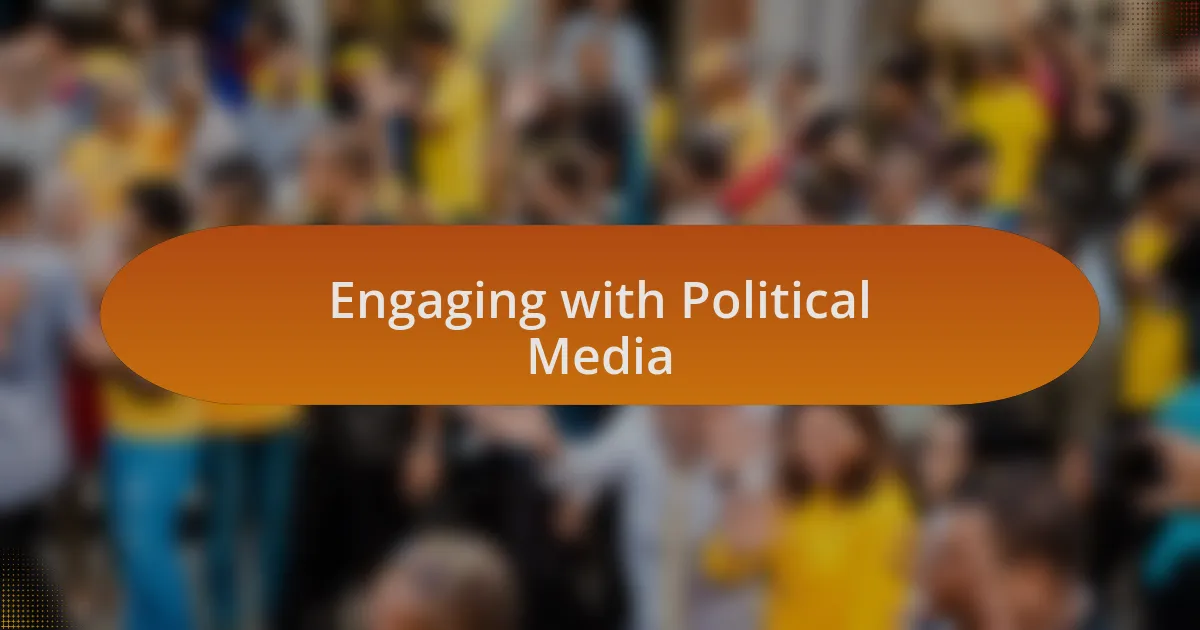
Engaging with Political Media
Engaging with political media is like stepping into a vast conversation where every voice matters. I remember the first time I tuned into a podcast focused on electoral issues; it felt like sitting around a kitchen table with friends discussing the world. The host’s relatable storytelling made complex policies feel accessible. How many times have you found that a well-told story brings clarity to confusing terms?
I also discovered that attending local town halls can be a game-changer. The first time I raised my hand during a Q&A, I felt an exhilarating mix of nerves and excitement. It was empowering to see my questions spark meaningful discussions among community members and officials. Have you ever thought about how your voice can influence decisions that affect your neighborhood?
Lastly, I’ve learned that engaging with political media often leads to unexpected connections. I remember sharing an article about voting rights with a friend, igniting a passionate debate as we dissected its implications. That moment made me realize that discussing these issues strengthens our understanding and fuels change. Isn’t it fascinating how a single article can transform casual conversations into opportunities for deeper insights?